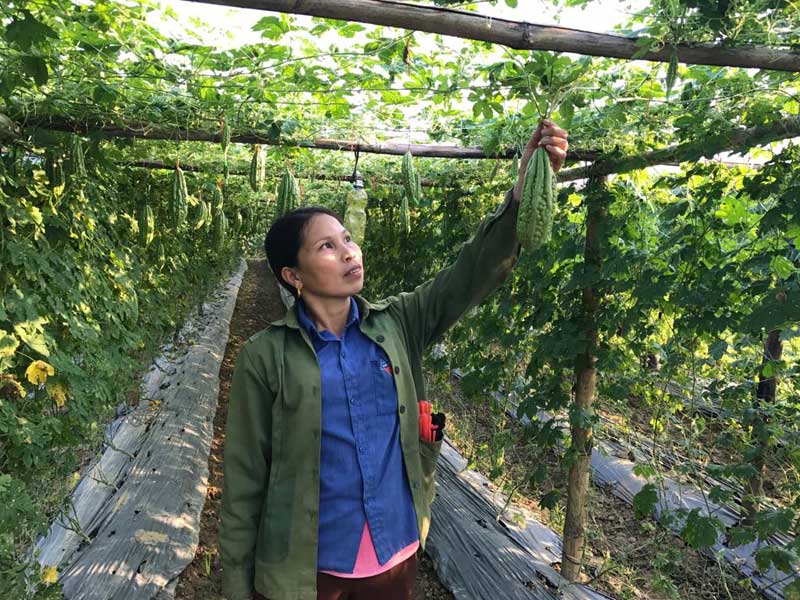
HBO – The Women’s Association in Du Sang commune currently has 1,154 members who belong to 21 chapters. President of the association Bui Thi Hien said that over the past time, the association has actively directed its chapters to intensify economic development in line with new-style rural area building.
At present, loan outstanding balance
reaches 8.7 billion VND (377,000 USD), benefiting 304 households. In addition,
the association manages 494 million VND of the Childfund project, which
provides loans for 506 members. These loans have proved effective, and many
outstanding individuals in economic development appear, such as Bui Thi Huong
and Bui Thi Lien in Bua Sao village with a wax gourd growing model, and Bui Thi
Hien in Bai Tam village with a citrus growing model.

The wax gourd and bitter melon growing model brings
about income of 8-10 million VND a month for the family of Ms Bui Thi Thuy in
Bua Sao village.
Ms Bui Thi Thuy, member of the Du Sang
Women’s Association – Bua Sao chapter, said: "In the past, as my family’s
economy depended on rice cultivation, our life was so hard and our income was
not much. Thanks to the movement of crop transformation of the commune Women's
Union, and the support of entrusted loans from the Vietnam Bank for Social
Policies, I bravely shifted the area of rice cultivation to growing vegetables,
thus bringing high economic efficiency. Currently, my family grows wax gourd
and bitter melon, with the average income of 8-10 million VND a month ".
To date, the communal Women’s Association
has built a lot of effective and sustainable economic models, bringing about
high incomes for members and contributing to the new-style rural area building.
Along with economic development, the association has carried out the "5 no – three
clean” movement effectively, with the rate of members using clean water and hygienic
toilets surpassing 90 percent. The association and its all-level chapters have
disseminated and encouraged women to implement family planning, avoid giving
the third child, use safe contraceptive methods and improve the quality of the
population. To boost the implementation of the campaign "Women join hands
in the new-style rural area building", members have actively contributed
money, labour days to participate in digging and clearing canals, building
infrastructure facilities and roads, well maintaining the roads self-governed
by women, conducting monthly sanitation, preserving environmental landscapes, and
ensuring security and order./.
Dao Village’s honey – a product certified with a 3-star OCOP (One Commune One Product) rating by Thong Nhat Agricultural Cooperative in Dao Village (Hoa Binh City) – is highly regarded by consumers for its quality, richness, and variety in packaging. The distinctively sweet taste of Dao Village’s honey leaves a lasting impression on anyone who has tried it.
In alignment with Project No. 07-DA/TU, issued by the Hoa Binh provincial Party Committee on November 1, 2021, Lac Thuy district has actively promoted investment and supported the sustainable development of its industrial and handicraft sectors during the 2021–2025 period. Alongside this, the district has remained committed to preserving and revitalising traditional craft villages.
Located in the northern part of Lac Thuy district, with a temperate climate and fertile soil, Phu Thanh commune has great potential and advantages in growing tea. The long-standing experience, combined with strict adherence to organic farming practices in the tea gardens, ensures that the dried tea products from Phu Thanh and Lac Thuy as a whole are sold out immediately upon production, providing a stable and prosperous life for the local people.
Amid efforts to streamline the administrative apparatus, Hoa Binh province has intensified measures to address challenges in land clearance, resettlement support, and infrastructure investment, aiming to speed up the progress of key projects.
Hoa Binh province has posted an unprecedented economic growth rate of 12.76% in the first quarter of 2025, marking its highest quarterly performance to date and positioning it as the second fastest-growing locality in the country, trailing only Bac Giang province.
Under current regulations, products in the One Commune – One Product (OCOP) programme that are rated three stars or higher must undergo re-evaluation every three months. However, in reality, some of these products fail to consistently meet the required standards, raising concerns about the sustainability of their OCOP certification. This underscores the urgent need for producers to enhance product quality and gradually develop their OCOP products into strong, marketable brands.



